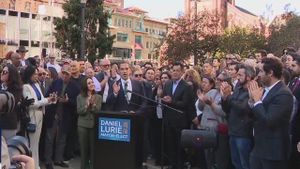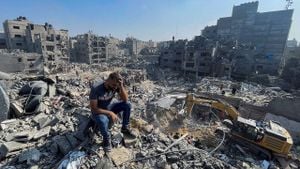The Indian Supreme Court recently delivered a stinging rebuke to state authorities across the country, denouncing the demolition of private properties—particularly those owned by minority Muslims—as largely unconstitutional. This controversial issue, which has sparked significant debate and anger, has been closely tied to what's termed "bulldozer justice," where state officials have demolished homes and businesses of suspected criminals without following due legal process.
The verdict, issued by a two-judge bench, came as part of hearings related to demolitions carried out under the rule of Prime Minister Narendra Modi's Bharatiya Janata Party (BJP). Critics have shared concerns over the targeting of Muslim communities, asserting these demolitions serve as punitive measures rather than lawful actions aimed at addressing illegal constructions.
Highlighting the plight of those affected, the court stated, "If a citizen's house is demolished merely because he is accused or even for being convicted, without the due process as prescribed by law, it’s unconstitutional for more than one reason." The judges pointed to the image of bulldozers leveling properties as reminiscent of lawlessness, clearly outlining the need for proper legal proceedings to be followed.
One of the petitions, filed by the Jamiat Ulama-i-Hind, argued against demolitions happening across several states, including Madhya Pradesh and Rajasthan, drawing attention to the tragic human cost of such actions. The rise of these demolitions has been alarming, with reports indicating over 150,000 houses were destroyed between January 2022 and December 2023, forcing more than 740,000 individuals out of their homes.
According to responses from various rights groups, the demolitions often leave families homeless without recourse. Amnesty International echoed this sentiment, demanding the end of unlawful demolitions, which they argue are disproportionately targeting Muslim populations. A representative noted, "Demolitions carried out without any due process have left many Muslims homeless or deprived of their livelihoods," underscoring the urgency of the situation.
These incidents have not only been condemned nationally but have also drawn international attention. Critics describe "bulldozer justice" as not simply policy but rather as emblematic of the growing assertiveness of Hindu nationalist sentiments, particularly following public violence or unrest involving Muslims. For example, during communal riots last year, over 1,200 properties, including homes, shops, and even mosques, were razed to the ground, raising alarm over the normalized aggression against Muslim spaces.
Reflecting on these troubling trends, the Supreme Court’s mandate included procedural safeguards intended to protect citizens from arbitrary state actions. The court clarified its expectations: no demolitions should occur without prior notices and mandated documentation of the process through video recordings. These measures are seen as necessary steps to uphold the rule of law, though the implementation will be closely observed.
Addressing the court’s decision, many hope it signals the beginning of the end for indiscriminate demolitions. They assert this ruling can be pivotal if state authorities are made to adhere to due process. Opponents of the demolitions remain cautious, pointing out the need for sustained advocacy and oversight to prevent state overreach and the bureaucratic assault on vulnerable communities.
With the legal framework now reiterated by the Supreme Court, the spotlight remains on how state governments will respond to these guidelines. Critics fear the BJP may disregard these mandates, continuing the demolitions under the pretext of local law violations.
Despite the challenges, the ruling is viewed as significant by numerous civil rights advocates, providing grounds for hope against state-led injustices rhetorically framed as crime deterrence. With bulldozers continuing to symbolize repression, advocates stress the importance of due process and justice, particularly for marginalized communities.
Moving forward, the community's trust hinges on whether the justice delivered by the Supreme Court can translate to real change on the ground, safeguarding citizens' rights to property and homes, and ensuring accountability from local authorities.



